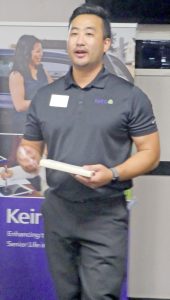The discussion offers tips on providing the best possible care for a loved one and offers thought-provoking questions about the future.
By Gil Asakawa, Contributor
How would you raise a toast to an elder loved one who has died?
It’s not exactly upbeat conversation fodder for a meal, but the crowd was engaged nonetheless during the Caregiving Café held during the JACL National Convention in Little Tokyo on July 20. The lunchtime session, held at the venerable Mitsuru Grill on First Street, was co-hosted by AARP, JACL and Keiro, the Los Angeles-based organization that provides services and programs for Japanese and Japanese American seniors.
The idea may seem gloomy, but Kevin Onishi, the chief operating officer of Keiro, kept the discussion light and respectful. He guided the audience members through a series of questions and table discussions about caring for family members and accepting their ultimate passing.

Kevin Onishi, chief operating officer at Keiro, facilitated the conversation around the “Let’s Talk About Death Over Dinner” model, where he asked participants lighthearted questions that then delved into more serious topics regarding aging and death. (Photo: Gil Asakawa)
And accepting their own death, too. Onishi based the discussion on a book by Michael Hebb that he recommended the attendees read, “Let’s Talk About Death (Over Dinner).” As lunches were served, he asked a series of questions sparked by how people would react if they found out they only had 30 days to live. One of the questions he asked audience members to discuss was, “What would your last meal be?” Another was, “Where would you go?” and also, “Who would you spend your last days with?”
“Japanese food,” “family” and “Japan” were, not surprisingly, among the more common answers. These questions got people to think about what elderly loved ones would consider valuable in their last days.
AARP for the past decade has dedicated a staff for outreach to the Asian American and Pacific Islander communities. Two AARP staffers, Scott Tanaka and JR Fujita, who contribute columns for the Pacific Citizen, were also on hand.
Onishi deftly managed the daunting task of cramming a much-longer presentation into a one-hour lunch-and-learn.
“The are so many reasons caregiving is important to our Japanese and Japanese American community because we have a tendency not to talk about our feelings with each
other, right?” he said. The point of the lunchtime talk, Onishi, explained, was to get attendees to think about how they approach death and dying. “If we don’t know how we would go about the grieving process, how are we going to know how to have those conversations with our loved ones?” he said.
If we can’t have those conversations with our loved ones, how are we going to be caregivers ourselves? Yes, this conversation sucks. It’s scary. It is awkward. But it can start with not-so-scary questions like, “What’s your favorite food?” “What food reminds you of your loved one?” And from there, you can go into more deeper questions: “Would you like end-of-life care?” “What about DNRs (do not resuscitate)?” “Physician-aided death?”
Some of the attendees had already had those conversations and asked their loved ones those difficult questions, which Onishi lauded. But most had not, so the conversation planted seeds that hopefully will sprout into fruitful conversations after the convention.
As Onishi pointed out at the end of the lunch, “The one thing is, aging is going to affect all of us, one way or another, whether you’re 20 years old, whether you’re 80 years old. Whether you have both of your parents, whether you don’t have any children.”
In the end, the sold-out presentation (which required RSVPs for the food order) left diners satisfied both physically and emotionally.



